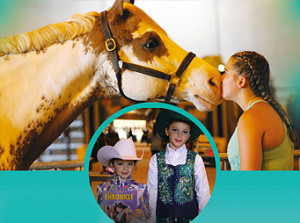What’s Your Trainer Teaching Your Kid?
Click here to read the complete article148 – August/September, 2016
BY DELORES KUHLWEIN
 A young mother listens impatiently, crossing her arms, and tapping her feet, as her own mother doles out unsolicited advice. “I don’t envy you having to raise a child these days,” the grandma declares. “The world has changed, and it’s a lot harder to protect your kids against negativity.” Her daughter tries to suppress rolling her eyes, while directing her attention back to her toddler.
A young mother listens impatiently, crossing her arms, and tapping her feet, as her own mother doles out unsolicited advice. “I don’t envy you having to raise a child these days,” the grandma declares. “The world has changed, and it’s a lot harder to protect your kids against negativity.” Her daughter tries to suppress rolling her eyes, while directing her attention back to her toddler.
That very scene dances around in the mother’s head several years later, now older and wiser with a preteen daughter in tow, as they stand in the stands at a local horse show. Her daughter is ready to move up to a new level with her horse, and confusion has set in. The family wants a positive, knowledgeable role model who reflects their own set of values, while also giving their daughter the best chance to be successful in the show pen. With grandma’s words ringing in her ears, she sits down to observe the practice arena, determined to find the best match for her child.
The Inadvertent Role Model
This mother knows what many others have discovered: any adult spending a great deal of time in a child’s life has a big impact on his or her outlook, conduct, values, and behavior. Whether intentional or inadvertent, horse trainers fill this role as teachers and coaches.
“Trainers and coaches have a unique opportunity to make a profound difference in the lives of the young athletes they instruct,” says Mary Meneely, Equestrian Team Coach at Auburn University Athletics. “Qualities of working hard, setting goals, never giving up, and working through frustration and disappointments are opportunities for growth and create a lasting impression on young riders.”
Sandi Morgan, Trainer at M&M Performance Horses in Provo, Utah, explains that the selection of a trainer or coach sends an important message, and it can be a positive or negative. “If your trainer is negative or a poor sport, you’re telling your child it’s okay to do the same. We can be good people 99.9% of the time, and we can go into the show pen wanting to win and beat our best friend, and be as competitive as we want. But, it’s the judge’s call; when we walk out of that pen, we need to be happy for them.” she says.
Click here to read the complete article148 – August/September, 2016










